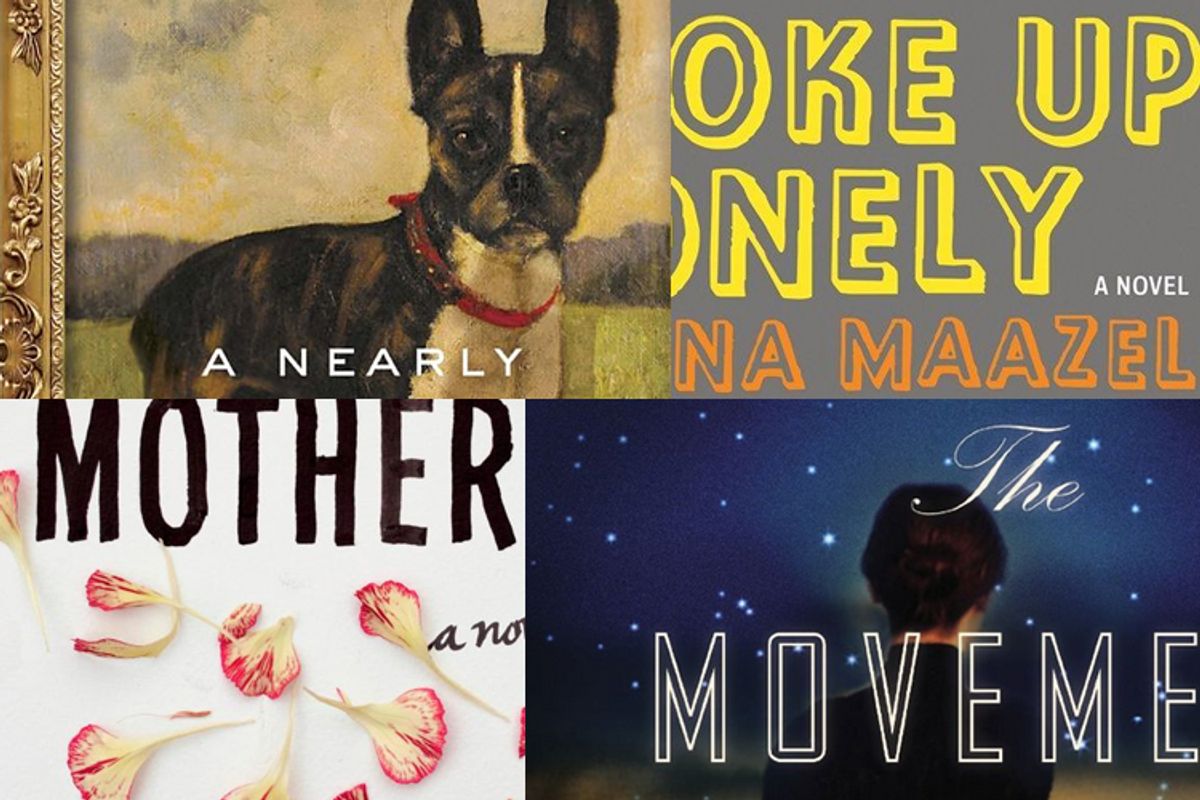Among the many sterling novels coming out this April, authors Allison Amend (“A Nearly Perfect Copy”), Amy Brill (“The Movement of Stars”), Jennifer Gilmore (“The Mothers”) and Fiona Maazel (“Woke Up Lonely”) have stood out.
I interviewed all four, limiting them primarily to incomplete sentences and indirect responses -- and asked them to pose questions to each other at the end.
Without summarizing the plot in any way, what would you say your novel is about?
FIONA MAAZEL: Loneliness! A city underneath the city of Cincinnati. North Korea. Labial reconstruction. Paths towards and away from estrangement. A cult. Some hostages. Cloud seeding.
ALLISON AMEND: "A Nearly Perfect Copy" challenges our presumptions about originality and authenticity, loss and replacement, and the perilous pursuit of perfection. OK, I copied that from the book jacket. But I wrote it the first time …
JENNIFER GILMORE: My novel is about a couple going through the labyrinthine process of a domestic open adoption. Along the way they discover a surprising amount about the horrible, wonderful and humorous aspects of the world of adoption, marriage and what it means to be a parent. But it's actually funny.
AMY BRILL: "The Movement of Stars" is about the many facets of human desire -- not only physical, but emotional, intellectual, professional.
Without explaining why and without naming other authors or books, can you discuss the various influences on your novels?
AMEND: Newspapers, dubious scientific achievements, topics requiring a great deal of research that I know nothing about. String cheese.
BRILL: Self-fashioning, whale-hunting, Quaker discipline, Big Brother, manifest destiny, sky-sweeping, comet-seeking, nebulas, double stars, lunar distance, the Nantucket shoreline and the King of Denmark.
GILMORE: Permission to write about sex, like, really write about it, permission to write with authority about a place I've never been, and a time I've never lived in, permission to write funny even if the material is serious. As mundane as it sounds: taking risks, be it formally or content-wise. Be bold. Always start a book with fear.
MAAZEL: I don't know! This question stumps me every time. So I think I'll just make something up because I could be right for all I know. Six Flags. Tuna salad. The Discovery Channel. The color green. Kleenex. My inner life. Peanuts.
Without using complete sentences, can you describe what was going on in your lives as you wrote this book?
AMEND: Job hunting, man hunting, “Battlestar Galactica,” auntie-hood, stinkbugs.
MAAZEL: Teaching. Traveling. Heartwreck.
GILMORE: Misery. Tragedy. Untold disappointment. Small moments of strange hope. Pretty much a shitty time of life, which I wish I could say writing totally turned around. Well, maybe it did a little.
BRILL: Looking for work, looking for love, looking for validation, looking for baby sitters.
I asked each of the writers to come up with a question for everyone (including themselves) to answer:
Gilmore: What are some words you despise that have been used to describe your book by readers and/or reviewers?
AMEND: Fizzy, bloodless.
MAAZEL: Bleak.
GILMORE: Raw. Truthful. Exhausting.
BRILL: "Interracial romance."
Brill: If you could choose a career besides writing (irrespective of schooling requirements and/or talent) what would it be?
BRILL: Gospel singer.
MAAZEL: Human rights activist.
AMEND: I already have a TVMD, which is a medical degree you obtain from watching television hospital shows; does hosting "Saturday Night Live" count as a career?
GILMORE: Veterinarian.
Amend: What craft elements do you think are your strong suit, and what would you like to be better at?
GILMORE: Like a schizophrenic, I hear the voices and I can capture them; most of what I'd like to do better has to do with process and focus, which affect what's on the page dramatically.
AMEND: I'm told I write snappy dialogue, and I think my characters are fairly well developed. If I could outsource plotting, that would be good (attention BRIC: entrepreneurial opportunity!), and I'd like to have more than one idea for a novel every five years.
MAAZEL: If I could plot like John Grisham, I would.
BRILL: Strengths: language, sentence-making. Needs improvement: pacing, plotting, prolificity. I'm slow.
Maazel: How do you contend with the hubris of thinking anyone has or should have any interest in what we have to say about anything?
AMEND: I try not to think about this; thanks for reminding me. Why don't you give me a paper cut and pour salt on it?
BRILL: If my compulsion to tell stories was driven by whether other people were dying to read them, I'd be in the wrong business. I just try to focus on the work, and hope for the best.
GILMORE: It is hard to look up from the dread of writing and look down from the ego which allows you to stay with something as long as one has to in order to write a novel, so I try to look straight ahead and just take it one sentence at a time; of course this never works for me and while I am proud to call myself a writer, on a daily basis there's a good deal of shame in that pursuit.
MAAZEL: I don't contend with it and just hate myself in the morning.



Shares